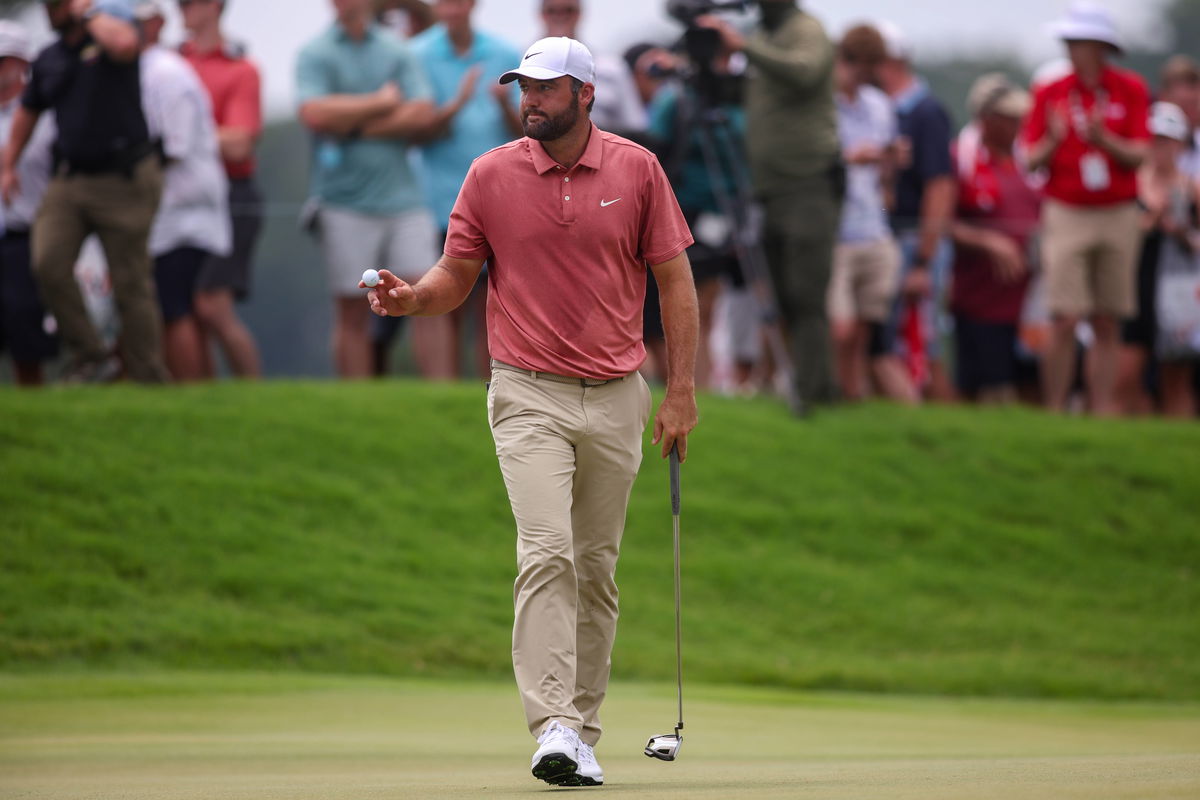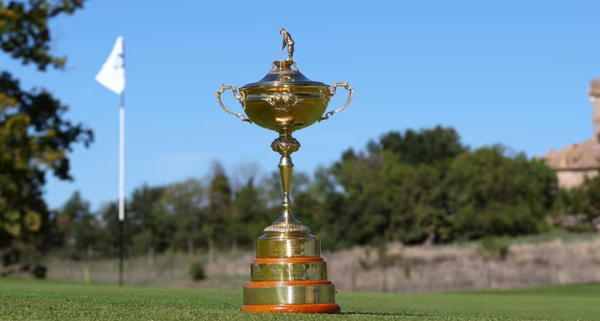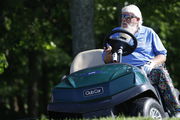
Imago
PGA, Golf Herren TOUR Championship – First Round Aug 21, 2025 Atlanta, Georgia, USA Scottie Scheffler reacts after making a putt on the first green during the first round of the TOUR Championship golf tournament. Atlanta Georgia USA, EDITORIAL USE ONLY PUBLICATIONxINxGERxSUIxAUTxONLY Copyright: xBrettxDavisx 20250821_bdd_ad1_094

Imago
PGA, Golf Herren TOUR Championship – First Round Aug 21, 2025 Atlanta, Georgia, USA Scottie Scheffler reacts after making a putt on the first green during the first round of the TOUR Championship golf tournament. Atlanta Georgia USA, EDITORIAL USE ONLY PUBLICATIONxINxGERxSUIxAUTxONLY Copyright: xBrettxDavisx 20250821_bdd_ad1_094
The US Ryder Cup team’s lack of team unity is not a new rhetoric. In contrast, Team Europe has maintained a positive light in the media, setting examples of team coherence and emotional connection beyond the team formalities. Many have pointed out the American golfers’ priority of personal achievements over their country’s legacy. However, one insider pinpointed the real reason behind these “narcissistic” tendencies.
Watch What’s Trending Now!
Speaking on the Fried Egg Golf Podcast, Andy Johnson didn’t hesitate when calling out the American team. Despite being American himself, Johnson laid it plain and simple: “I think that the Americans and I don’t want this to come across necessarily the wrong way, but there’s just more narcissistic tendencies on the American Ryder Cup team.”
The Patrick Reed vs Jordan Spieth feud back in 2018 is just one of many stories that back Johnson’s claim. In fact, Reed’s hot-headed retaliations further brought forward the prioritization of individual egos over team dynamics inside the roster. “For somebody as successful in the Ryder Cup as I am, I don’t think it’s smart to sit me twice,” was what Reed had argued after the game. The controversy was bubbling hot back in the day, and continues to push the narrative of their self-centered approach.
ADVERTISEMENT
Revealing what contributes to the internal conflicts, Johnson stated, “I’m actually amazed when you interview or talk to these players about athletics growing up. How many golfers say, ‘I picked golf because I didn’t have to rely on teammates.'” Co-host Kevin Van Valkenburg agreed with Johnson. “That’s like a number one draft pick in terms of reasons why they decided to do it,” Valkenburg noted. And undeniably, this is probably the most common reason the American roster doesn’t go well together.
Picking up the clubs at an early age, most of the American golfers learned to rely on themselves. This early focus on solo performance fostered a feeling of independence. On the flip side, it essentially made it harder for the golfers to adjust and adapt to the team dynamics. In the stroke-play events on the PGA Tour, that doesn’t affect their gameplay much. However, in a head-to-head competition between two teams, the Ryder Cup takes away the individual element that the Americans grew attached to. That leads to reduced coherence and compatibility between the team members.

Imago
Credit: Via PGA Tour
Moreover, the solo club early on hindered transparency and communication. Commenting on that, Johnson added, “‘I didn’t play well with others, so I decided to go into golf.’ So then you have this event where they don’t ever play with others, and then you bring them together and they have to play as a team—and the captain gets blamed no matter what.” Just 2 years ago, Zach Johnson faced heavy internal criticism due to the team’s performance, leaving no doubt about Johnson’s verdict.
ADVERTISEMENT
In contrast, the European team has never lashed back at their captains despite many heartbreaking losses. Valkenburg pointed out the only exception to Nick Faldo back at Belfry in 2002. Faldo had made a controversial comment, remarking that Sergio Garcia‘s recent breakup left him “worthless” to the team. Garcia’s teammates had none of it, opening criticizing Faldo. This incident serves to strengthen the case for the unity and chemistry among the European team members.
ADVERTISEMENT
However, Team USA has polar opposite stories among its rosters, none more dramatic than the Brooks Koepka & Bryson DeChambeau feud.
Top Stories
Pebble Beach Looks Unrecognizable as Harsh Weather Destroys Iconic Golf Course

PGA Tour Hands Veteran Pro 1-Year Ban Despite Severed LIV Golf Ties

Phil Mickelson’s LIV Golf Hope Shatters After Akshay Bhatia Decision

John Daly to Keep Masters Tradition Alive Despite Hooters’ Bankruptcy Shutdown

Tiger Woods Finally Answers Nelly Korda & Co.’s Demands With Major LPGA Announcement

The infamous DeChambeau vs. Koepka fiasco before the 2021 Ryder Cup
To get a better understanding of the duo in the Ryder Cup, we need to travel back to the Dubai Desert Classic in January 2019. Bryson DeChambeau, known for his scientific approach to golf, took his time hitting the shots. That nudged Brooks Koepka to make the comment that started it all. Commenting on his slow-play, Koepka didn’t mince words, saying, “I just don’t understand how it takes a minute and 20 seconds, or a minute and 15 to hit a golf ball — it’s not that hard. It’s always between two clubs: there’s a miss short, there’s a miss long. It really drives me nuts, especially when it’s a long hitter.”
ADVERTISEMENT
This comment didn’t sit well with DeChambeau, who lashed back at Twitch in 2020, commenting on Koepka’s physique. “I don’t know if his [Koepka’s] genetics even make him look good, to be honest… That Body Issue, he didn’t have any abs, I can tell you that.”
So far, not so good. Things escalated pretty quickly during the 2021 PGA Championship. Both players were contending for the event. A clip of Koepka mid-eye-roll as DeChambeau walked past him leaked online and went viral almost instantly. Allegedly, DeChambeau was walking behind the former, his metal spikes clanking loudly on the pavement. A frustrated Koepka later admitted, “I lost my train of thought… yeah, hearing that bullsh-t.”
A rogue video of Brooks Koepka eye-rolling Bryson DeChambeau into another dimension during an interview at the PGA Championship is taking Twitter by storm 😳: https://t.co/cH1sOZTXsW pic.twitter.com/ku661QbBqk
— Golf Digest (@GolfDigest) May 25, 2021
ADVERTISEMENT
Despite the drama, the feud reached an unexpected turning point at the 2021 Ryder Cup. With overbearing pressure on the US team, the golfers managed to reconcile, at least for the week, offering to pair together if the captain needed. That served as an act of truce, bridging the cracks.
The story brings out that Team USA’s biggest opponent has always been itself. Individual egos and clashing personalities keep testing their ability to come together when it matters most.
ADVERTISEMENT
ADVERTISEMENT
ADVERTISEMENT

